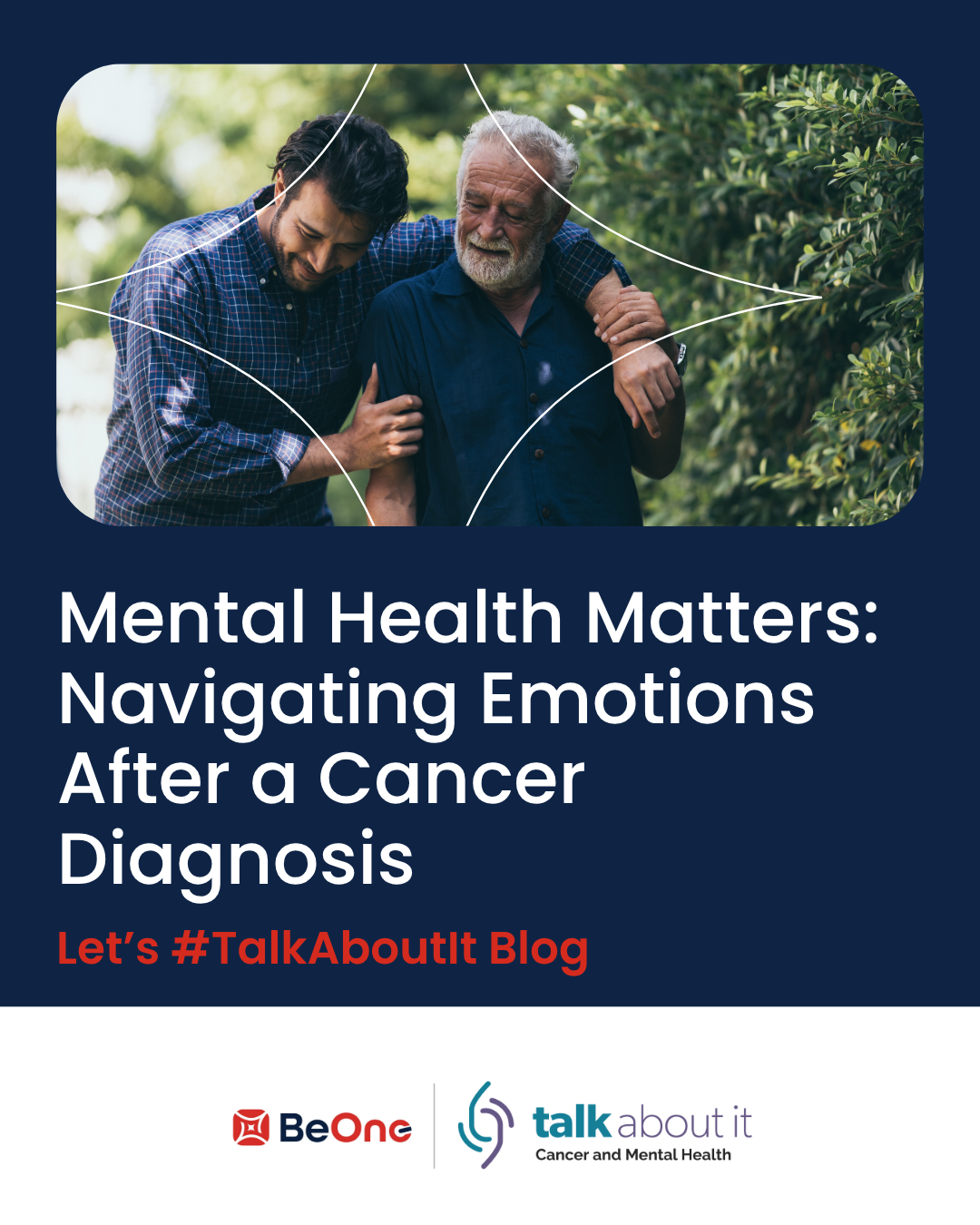
Mental Health Matters: Navigating Emotions After a Cancer Diagnosis
By Lisa Marquette Porat, MSW, LCSW, FAOSW
May 2025
Cancer doesn’t just affect the body, it strikes at the heart of your emotional world. From the moment of diagnosis, you’re thrust into a whirlwind of uncertainty, fear, and vulnerability. May is Mental Health Awareness Month—a timely reminder that more than one-third of cancer patients feel lonely after diagnosis, and two-thirds don’t receive mental health referrals. That’s why BeOne, guided by our core value of Patients First, is committed to working with the cancer community to address the emotional needs of patients alongside physical care.
The Emotional Impact of a Cancer Diagnosis
Being told you have cancer is more than just medical news—it can feel like your entire world is shifting beneath your feet. There are “new normals” to be navigated at each step of the way—even after diagnosis. Common emotional responses include:
- Shock and numbness: Many people describe the diagnosis moment as surreal or dreamlike.
- Fear and anxiety: Worry about treatment, survival, or the unknown can be constant.
- Sadness and grief: There may be a sense of loss—not only of health, but of plans, routines, or identity.
- Anger and frustration: “Why me?” is a question that often arises.
- Guilt or shame: Some people blame themselves or feel like a burden to loved ones.
It is normal to experience these feelings at any point when dealing with a diagnosis of cancer—they’re natural reactions to a life-altering experience. But when they build up, they can create emotional exhaustion, or what some describe as an “invisible weight” that makes even simple tasks feel overwhelming. A person’s mental health can actually affect their physical health. People can be less likely to be actively engaged in treatment decisions or adhere with treatments when they feel emotionally overwhelmed.
Tips for Coping with the Emotional Challenges of a Cancer Diagnosis
1. Name What You’re Feeling
Start by simply acknowledging your emotions. You don’t need to fix them right away—sometimes there is no “fix”. Naming what you’re going through—“I feel scared,” “I’m grieving who I was before cancer”—can help release some of the inner tension and validate your experience.
2. Don’t Go It Alone: Talk to a Professional
A therapist, counselor, or oncology social worker can help you process the emotional storm you’re facing. They provide a safe, nonjudgmental space to:
- Explore fears about mortality
- Manage the rollercoaster of hope and fear throughout the cancer journey
- Learn tools to calm anxious thoughts
- Cope with body image, identity, and relationship changes
Your hospital or cancer center may offer integrated mental health services. Support is often available, but not always automatically offered. As your doctor for help. You can also look for free community support and resources on our Talk About It cancer and mental health website.
3. Embrace Support Networks
Sometimes the hardest part is asking for help. Whether it’s family, friends, spiritual counselors, or support groups, leaning on others can relieve emotional isolation. Asking for help is a sign of weakness, but one of resilience and strength. It takes courage to ask for help.
Peer support, including talking to others who’ve been through cancer, can also be especially grounding.
4. Practice Emotional Release and Mindfulness
Bottled-up emotions don’t disappear—they show up in other ways, like insomnia, irritability, or physical symptoms. Options to express your feelings include:
- Journaling: Write freely, without judgement.
- Creative outlets: Art, music, or movement can express what words can’t.
- Mindfulness or meditation: Helps create space between emotions and reactions.
- Crying or venting: A natural, healthy release that can be surprisingly comforting—even if you fear falling apart, letting go can help you feel more whole.
5. Reclaim Small Moments of Control
Cancer can make life feel unpredictable and powerless. Finding small routines or decisions you can control—what you eat today, what you wear, or how you spend an afternoon—can rebuild a sense of stability and calm.
6. Stay Connected to Purpose
Emotional resilience doesn’t mean feeling strong all the time—it means remembering what matters to you, even when things are hard. Whether it’s your family, faith, creativity, or simply a desire to see tomorrow, staying anchored in purpose can guide you through the difficult moments.
When Emotional Struggles Need More Support
If you’re experiencing the following, it may be time to reach out for immediate help:
- Persistent sadness or hopelessness
- Panic attacks or racing thoughts
- Withdrawing from loved ones or daily life
- Changes in sleep or eating habits
- Thoughts of self-harm or suicide
Mental health care is an essential part of healing. And there are professionals ready to support you without judgment.
Final Thoughts: You Are Not Alone
There is no “right” way to feel or cope with cancer. What matters most is knowing that your feelings are valid, your pain is seen, and help is available. You are more than your diagnosis. You are resilient, even when you’re vulnerable. You are allowed to ask for help. Facing cancer takes enormous courage, and caring for your mental health is part of that strength. Be kind to yourself, reach out, and know that healing happens on many levels.
Let’s Talk About It is our blog series designed to talk frankly about some of the real-life challenges the resiliency of living with a diagnosis of cancer to empower others, and available resources. If you have topics, you’d like Lisa to explore, please email us patientadvocacy@beonemed.com with your ideas.
We believe in you and the power of your story. We thank you for sharing your journey with us and others.
Lisa Marquette Porat, MSW, LCSW, FAOSW is the U.S. Lead, Patient Advocacy for BeOne Medicines, USA